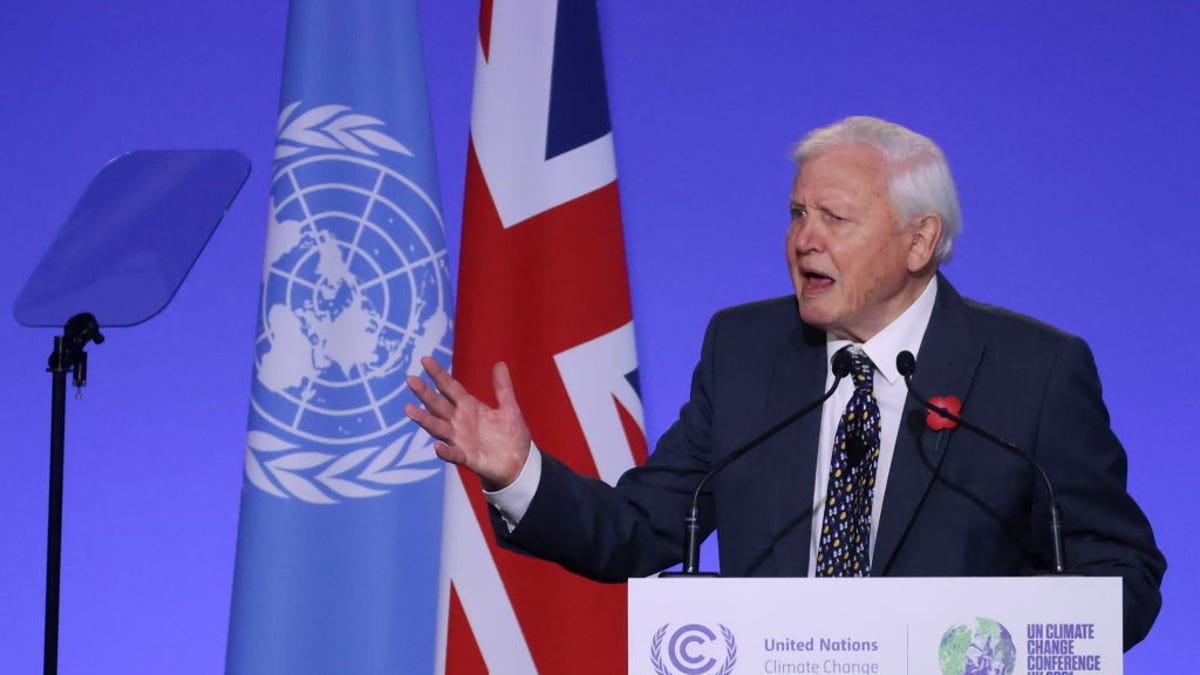As COP26 climate talks kick off, chaos and hope jostle for the limelight
Look below the surface of political grandstanding, and you'll find reason for hope as the world comes together to tackle the climate crisis.

David Attenborough on stage at COP26.
Powerful figures including US President Joe Biden and UK Prime Minister Boris Johnson descended upon Glasgow, Scotland, on the second day of COP26, the United Nations' climate summit. The likes of French President Emanuel Macron and Scottish first minister Nicola Sturgeon could be seen wandering the corridors of power at the gloomy conference center, as world leaders and environmental experts alike traveled -- some through turbulent weather -- to talk about how to rein in global warming.
But regardless of the importance of the prime ministers and presidents in attendance, everyone inside the summit and watching along online seemed to be talking about the same thing: a speech made by conservationist and television presenter David Attenborough during the opening ceremony of the World Leaders Summit.
"Is this how our story is due to end?" said the 95-year-old stalwart of the BBC's Natural History Unit, taking the stage after Prince Charles. "A tale of the smartest species doomed by that all-too-human characteristic of failing to see the bigger picture in pursuit of short-term goals?"
As Attenborough spoke, footage of climate-based disasters filmed around the world played on the screens behind him, painting a picture for the world leaders in attendance of the apocalyptic chaos the Earth is already enduring.
The conference comes at a critical point in the fight to reverse the climate crisis. A report earlier from the UN's Intergovernmental Panel on Climate Change, or IPCC, this year described the climate situation as a "code red for humanity." Wildfires, hurricanes and other forces of nature have ravaged countries around the world, a consequence of warming temperatures.
Closer to home, many delegates traveling to Glasgow from London had faced down weather-related troubles of their own. Storms that downed trees meant that all trains were canceled. People were scrambling to book the flights they'd been asked not to take in order to travel to the world's most important climate conference. Once they reached the summit, many delegates also reported difficulties in accessing the venue, citing long queues and confusion over taking daily COVID tests.
The chaos of these first couple of days has cast a long shadow over the summit in early media coverage. But it's not the only version of the story of the first two days of COP26.
In contrast, my own experience has been remarkably chaos free. I had no problems using public transport to reach the venue from Edinburgh, some 50 miles (80 kilometers) away, and waited only around 10 minutes in a fast-moving queue to quickly pass through the airport-style security to access the summit.
It just goes to show that interpreting how COP26 is going so far is all a matter of perspective.
The same is true of the political negotiations. Whether the G-20 talks that took place in Rome last week went well or whether they didn't depends on who you ask. World leaders failed to agree on an end date to their use of coal and to get all countries to commit to net zero by 2050, which didn't make for an optimistic start to the UN climate summit in the eyes of many onlookers.
But speaking at an event at the US Pavilion inside of COP26 on Monday, US Special Presidential Envoy John Kerry praised the success of the G-20, pointing out that more than half the countries now have concrete plans to keep temperatures from rising beyond 1.5 degrees, a key benchmark listed in the Paris Agreement.
Political showboating and logistical difficulties have stolen much of the limelight at the summit so far. But failing to look beyond these narratives obscures the moments of hope and humanity at COP26. There are plenty of them to be found, if you peek past the chaos.
An opening ceremony hosted by the COP26 coalition.
On Sunday, the COP26 coalition -- a collection of civil society groups organizing for climate justice -- held its own opening event on the sidelines of the summit. It was followed by a ceremony in which Scottish children washed the feet of visiting Indigenous elders to rid them of the dust of their journey. I found it touching to observe the tenderness of the ritual, which showed a respect for the dignity of all people coming to Glasgow -- not just the dignitaries.
It's an example of the way that many of the most powerful and moving moments of this summit are likely to occur beyond the walls of the conference center, as activists from around the world come together to represent climate justice and a cross-section of human-rights movements.
During the launch event, 21-year-old Scottish activist Lauren Macdonald, who last month challenged the CEO of Shell to his face onstage at the Ted Countdown Summit, spoke of the importance of cultivating hope.
"I want to just remind you that hope is a verb," she said. "It's not something that you automatically have or don't have. It can be something that you actively practice."
Her sentiments were echoed by Attenborough, as the images on the big screen switched from showing footage of destruction to footage of dolphins playing in the waves and people marveling at the northern lights.
When people in the future look back on COP26, all they will ask is whether it was the moment that governments were able to reverse the concentration of carbon in our atmosphere due to commitments made in Glasgow, he said. There's every reason, he added, that the answer to that question should be yes.
"We are the greatest problem-solvers to have ever existed on Earth," said Attenborough. "If working apart we are a force powerful enough to destabilize our planet, surely working together we are powerful enough to save it."

